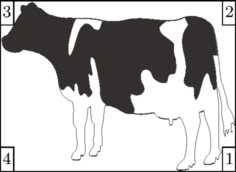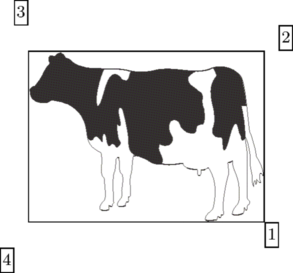Difference between revisions of "Collectors"
Jump to navigation
Jump to search
m |
|||
| (3 intermediate revisions by 2 users not shown) | |||
| Line 1: | Line 1: | ||
| − | |||
| − | |||
Collectors are an alternative to overlays that can be used to build-up composite objects. | Collectors are an alternative to overlays that can be used to build-up composite objects. | ||
[[Layers]], on the other hand, are used to define whole pages. | [[Layers]], on the other hand, are used to define whole pages. | ||
| Line 24: | Line 22: | ||
{\framed{4}} | {\framed{4}} | ||
| − | + | \composedcollector{example} | |
| − | |||
| − | |||
\stoptext | \stoptext | ||
| Line 32: | Line 28: | ||
</td><td> | </td><td> | ||
<context> | <context> | ||
| + | \setupexternalfigures[location={local,default}] | ||
\definecollector[example] | \definecollector[example] | ||
\setcollector [example] {\externalfigure[cow][width=4cm,frame=on]} | \setcollector [example] {\externalfigure[cow][width=4cm,frame=on]} | ||
| Line 64: | Line 61: | ||
{\framed{4}} | {\framed{4}} | ||
| − | + | \composedcollector{example2} | |
| − | |||
| − | |||
\stoptext | \stoptext | ||
| Line 72: | Line 67: | ||
</td><td> | </td><td> | ||
<context> | <context> | ||
| + | \setupexternalfigures[location={local,default}] | ||
\definecollector[example2] | \definecollector[example2] | ||
\setcollector [example2] {\externalfigure[cow][width=4cm,frame=on]} | \setcollector [example2] {\externalfigure[cow][width=4cm,frame=on]} | ||
Revision as of 22:08, 6 June 2020
Collectors are an alternative to overlays that can be used to build-up composite objects. Layers, on the other hand, are used to define whole pages. See the details manual for further explanations.
Example
Adding labels to a figure.
\starttext \definecollector[example] \setcollector [example] {\externalfigure[cow][width=4cm,frame=on]} \setcollector [example] [corner={right,bottom},location={left,top}] {\framed{1}} \setcollector [example] [corner={right,top},location={left,bottom}] {\framed{2}} \setcollector [example] [corner={left,top},location={right,bottom}] {\framed{3}} \setcollector [example] [corner={left,bottom},location={right,top}] {\framed{4}} \composedcollector{example} \stoptext |
|
There is no confusion if the added text is placed within the first object. However,
\starttext \definecollector[example2] \setcollector [example2] {\externalfigure[cow][width=4cm,frame=on]} \setcollector [example2] [corner={right,bottom},location={right,bottom}] {\framed{1}} \setcollector [example2] [corner={right,top},location={right,top}] {\framed{2}} \setcollector [example2] [corner={left,top},location={left,top}] {\framed{3}} \setcollector [example2] [corner={left,bottom},location={left,bottom}] {\framed{4}} \composedcollector{example2} \stoptext |
|
Notice that the size of the collected object grows as text is added. As a consequence, the positions of the corners get redefined as the bounding box grows.
 |
TODO: We need more documentation and examples for this complicated subject. (See: To-Do List) |

